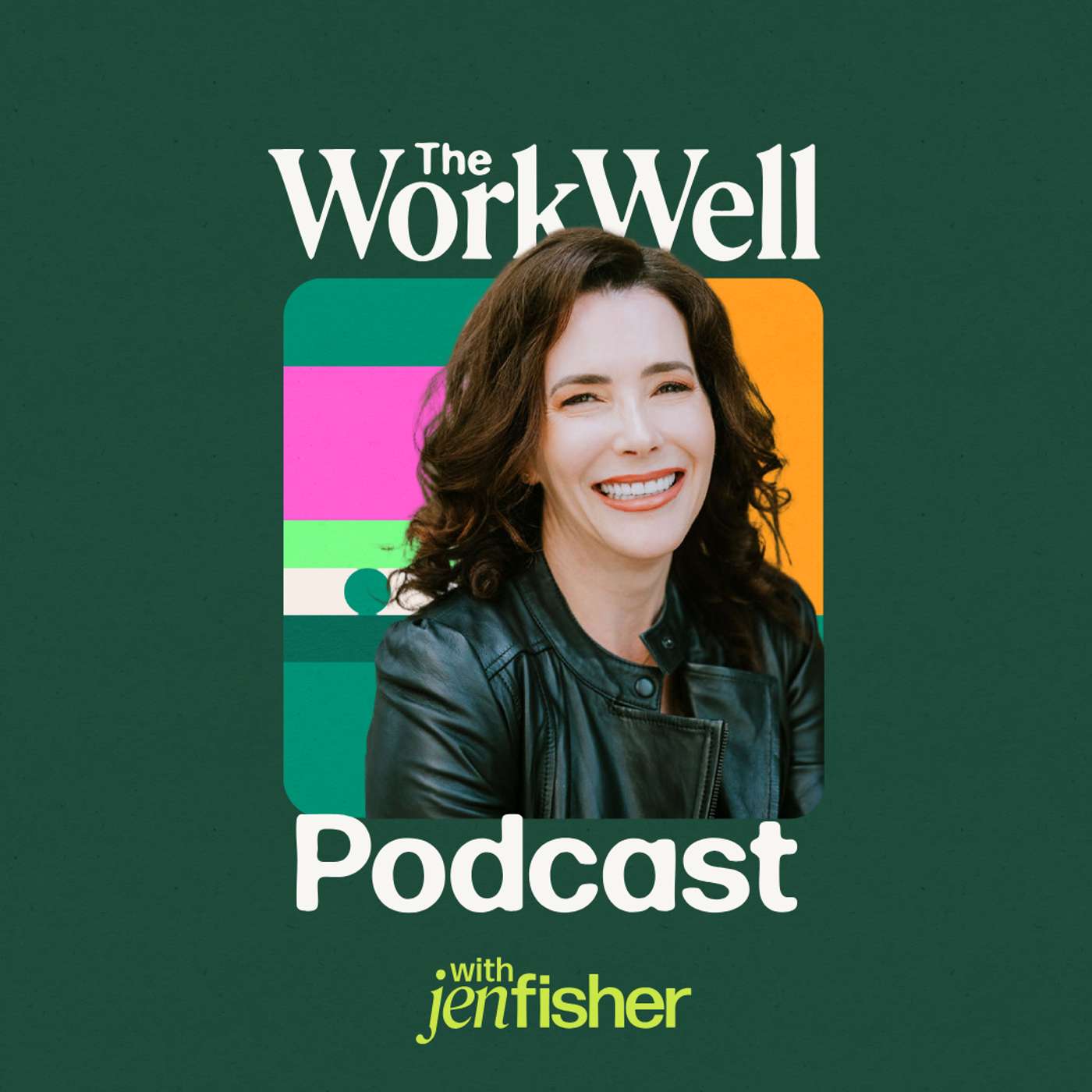
The Balanced Badass Podcast®
The Balanced Badass Podcast® is the show for high-achieving professionals who want to prevent burnout, master work-life balance, and stay badass without losing their sanity.
Each episode, we’re not just tackling your overflowing calendar and keeping your household on track; we’re getting into burnout prevention and recovery strategies so that you have time to breathe, laugh, and savor that much-needed glass of wine at the end of the day.
Think of this podcast as your regular dose of practical advice, a touch of humor, and a little tough love, like catching up with a friend who just gets it. Whether you’re navigating burnout, balancing meetings and meal prep, or carving out moments of self-care, this is the space where we figure it out together.
Disclaimer: My content is for educational purposes only and not a substitute for professional medical or mental health advice. For serious concerns, please consult a qualified provider.
The Balanced Badass Podcast®
Award-Winning Culture, Just Don't Look Too Closely
In this episode, we explore the stark contrast between the glowing reputation of "top companies to work for" and the unsettling reality many employees face.
Despite impressive awards and certifications, many workplaces fail to deliver on their promises of a supportive, healthy environment. We explore personal experiences, the concept of cultural debt, and the pitfalls of culture certifications.
Job seekers and current employees alike will learn to trust their instincts and ask the right questions to avoid falling for polished façades. Tune in to understand why a shiny badge doesn't always guarantee a healthy workplace.
Check out the detailed show notes (https://tarakermiet.com/podcast/) and leave your thoughts or questions about today's topic.
00:00 Introduction: The Illusion of a Great Workplace
00:43 The Reality Behind the Badge
01:22 Personal Experience: The Disconnect
06:01 Understanding Cultural Debt
08:15 The Flaws in Culture Certifications
13:07 Navigating Job Hunting with Discernment
16:50 Conclusion: Building Healthier Workplaces
Got something to say? Text me!
-----
I’m Tara Kermiet, a leadership coach, burnout strategist, and host of The Balanced Badass Podcast®. I help high-achievers and corporate leaders design careers that are successful and sustainable.
Here, you’ll find tactical tools, leadership lessons, and burnout education that just makes sense.
👉 Start by taking my free Burnout Drivers Mini Assessment
😍 Join my community on Instagram (@TaraKermiet) and/or TikTok (@TaraKermiet) so we can stay connected!
🎤 Got a question, a topic you want me to cover, or just want to share your thoughts? I'd love to hear from you! Send me a DM or email.
Stay balanced, stay badass, and make good choices!
Disclaimer: My content is for educational purposes only and not a substitute for professional medical or mental health advice. For serious concerns, please consult a qualified provider.
[00:00:00] Okay, so you've just landed the job. It's supposed to be a step up for you, a healthier environment, a place you'll feel like you can finally breathe again. The team seems cool, the benefits are solid, and right there on the website or in your welcome packet is the badge certified. Great place to work.
Ranked top 50 company for women. Best place to work in technology, and for a second, maybe a little bit longer, you let your guard down because they've been recognized publicly, officially, repeatedly. So surely it means you'll be supported, that you've finally found a culture where people matter. But then time passes and you start to notice what's underneath the polish.
People are constantly on edge. Slack goes quiet when hard topics come up. Everyone is saying they don't have the bandwidth and that values aligned culture you were [00:01:00] promised. It also starts to feel more like a performance that you're expected to participate in. That's what today's episode is about, the disconnect between the culture that gets celebrated and the culture that actually exists.
We're gonna talk about what happens when the workplace that's supposed to be the one turns out to be just another shit show. So here's the deal. I used to trust those awards, like really trust them. When I was job hunting to get out of higher ed, I'd filter job boards by companies with culture certifications.
I thought I was being strategic hell, I was using it as a protective measure for myself. Because if a company had been recognized for its culture, that obviously meant that the hard stuff was already handled. I thought it meant that I could show up as myself and feel happy throughout my workday, but then I got the job.
Yay. But what I experienced, yeah, that wasn't the badge I was promised. There were [00:02:00] all the right words. We were people first. We valued transparency. We were mission driven. There were branded notebooks, virtual town halls, and onsite all staffs with tickets to Disney and open bar dance parties. But behind the curtain of all of that was pure chaos.
I was drowning in unrealistic expectations and back-to-back meetings with no space to think. If you've tuned in before, you've probably heard me talk about how I was getting physically sick with stress, migraines, insomnia, and panic attacks. I started blaming myself for not being able to thrive in a culture that everyone else seemed to think was amazing.
That's the thing about working in a great place. When it's not great for you, it messes with your head, am I the weak one? Do I just need to be more grateful? What if I'm just not cut out for this? And when you're a high achiever, that line of thinking is dangerous because your default setting to fix this is to [00:03:00] push harder to over function and to continue to prove your worth by doubling down.
Essentially, you try to become the exception in a system that's already running on dysfunction and the entire time the organization is pointing to the badge on the proverbial wall going, look at how great we are. Look how lucky you are to be here. Meanwhile, you're unraveling. Listen, this isn't about disparaging any particular company.
It's about naming what so many people are experiencing behind the gloss. Now what makes this whole thing so disorienting isn't just that your workplace isn't what it claimed to be. It's that the discrepancy is subtle. It's slow, it's confusing on purpose because it's probably not like your boss is screaming at people or you're working in some obvious HealthScape, or at least I hope that's not the case.
It's that you're constantly bumping up against these seemingly simple contradictions. Maybe leadership says they want feedback, but they're only open to the kind that [00:04:00] doesn't make them uncomfortable,
or your company preaches balance, but then expects you to do whatever it takes to get the product launched off the ground. Even if that means working nights and weekends, perhaps you are encouraged to bring your full self to work, but the moment you show any kind of emotion, you are now treated very differently.
Or the brand of the company is all about being people first, but in reality, it's more like process first. Optics first and ego first. Every time you notice that disconnect, your brain gets to work, trying to close the gap, you rationalize, you adjust. You try to make it make sense. It's probably just the department you're in.
Maybe you are just not used to this kind of fast-paced environment. And really all jobs are stressful, so this is normal, right? And the kicker is that everyone else is probably doing the same exact thing. No one wants to admit they're struggling, especially in a place that's been so publicly celebrated.
So we [00:05:00] all smile and put on a mask as if we're doing okay. Meanwhile, the system that's the real problem, remains untouched. That's why cognitive dissonance, which is exactly what this kind of friction is, is so dangerous in certified workplaces because it not only confuses people, it also isolates them.
It convinces them that their pain isn't valid because the narrative is too powerful to question. You've been gaslit by branding. And the longer that gap goes unnamed, the more likely you are to stay in it, telling yourself you're just in a funk, or that you're being too sensitive. But what if you're not?
What if your body and your intuition are simply picking up on what the badge can't see? Because culture isn't a label or a shiny award. It's a pattern. And when those patterns don't align with the story that you've been told, your nervous system knows it. Even if your rational brain is still trying to play along.
The thing is culture doesn't usually crumble [00:06:00] all at once. It erodes slowly, often without a clear turning point that you can pinpoint and that erosion happens through what we call cultural debt. It is just like technical debt in the world of software. You take a shortcut to meet a deadline, you patch something instead of fixing the root issue, and it works for now, but every time you avoid the real repair work, you're borrowing against the future.
And eventually those shortcuts come due
in workplace culture. It's the same story. Cultural debt is what builds up when an organization keeps kicking the can down the road. When they avoid hard conversations, when they bypass accountability, when they invest in surface level engagement campaigns instead of meaningful structural change. Every time a leader breaks trust and there's no follow up conversation, that's cultural debt.
Every time someone gets promoted, even though they're known to be toxic, behind closed doors. Cultural debt. Every time an employee offers thoughtful feedback and it disappears into a black hole of [00:07:00] silence. Yep. Debt, you don't really notice it at first. Just a little discomfort, a little confusion. A little hesitation to speak up in a meeting.
But over time, the interest compounds and what started as a few missed opportunities for integrity or clarity becomes a full-blown credibility crisis.
The culture starts to feel heavy, sticky, incoherent. You start hearing things like, that's just how it is here, or, we tried that once, but nothing changed or my personal favorite, don't take it personally. That's just the way he communicates. And just like any other debt, the longer you ignore it, the more expensive it gets.
It starts with small things. People get a little quieter in meetings. They stop volunteering for extra projects. There's less energy and less creativity. Everyone kind of just keeps to themselves because they don't trust one another, and then the disengagement sets in. But a lot of companies don't even recognize cultural debt [00:08:00] until it shows up as turnover, until exit interviews start painting a very different picture than the one in your public facing culture deck.
And at that point, it's not just about repairing the culture. It's about repairing the relationships, the trust, and the credibility.
Now I wanna get into the part that's kind of shaping the problem, and that's the way culture is measured and marketed in the first place. I'm talking about those recognition programs and certifications, like Best Place to Work, top Workplace, or greatest employers.
And listen, these kinds of culture certifications aren't inherently bad in theory. They're trying to measure something worthwhile, like employee experience, trust in leadership, engagement and belonging. And I get why we want those things to be quantifiable. We wanna believe that there is a formula for a healthy workplace, these certifications often tell you more about what the company is trying to be rather than what it actually is.
They measure surface level signals, not the structural reality. They [00:09:00] measure what people feel safe enough to say at the time the survey is administered, and they almost never account for what's happening at the margins of the organization, where equity gaps live, where emotional labor is visible, and where power gets concentrated in all the familiar places.
I'm not saying that every company that's been recognized with one of these certificates is secretly toxic or faking it. That's not fair. And quite frankly, it's not true. But what is true is that these certifications are a snapshot, a curated moment in time, and what they reflect depends entirely on who's in the room, who feels safe enough to answer honestly, and what leadership chooses to highlight when the results come in.
They don't show you how trust is built or broken. They don't show you what happens when someone speaks up and names something uncomfortable and they don't show you whether team leads know how to hold space for their people.
A badge can tell you. The company ran a survey. It doesn't tell you what got swept under the rug before they sent it out. It can tell [00:10:00] you the average employee score. It doesn't tell you which departments are crumbling or which marginalized employees are disengaging. Certifications don't capture nuance.
They don't reflect the smaller moments that define how safe or unsafe a culture really is. And they definitely don't account for who gets to define what great even means, because in reality, a company can be a great place to work for some people and an absolute soul crusher for others. You can have a value statement on the wall, DEI, metrics in your report, mental health webinars on the calendar. And you can still have black employees being talked over in meetings, women being passed over for stretch rolls, or introverts being penalized for not showing up energetically enough.
In brainstorming sessions, the badge doesn't catch that. The award committee doesn't dig into power dynamics, identity, safety, or whose shouldering the emotional load of keeping the culture functional.
And when you're a job seeker, especially [00:11:00] one who's recovering from burnout and trying to make a more sustainable move, you see that badge and naturally think finally, safety, alignment, and belonging. You think you found a place that won't ask you to sacrifice your wellbeing, to prove your value, and sometimes you have.
But far too often you walk into a workplace that has all the right language and none of the relational follow through a workplace that has built an incredible reputation for being supportive, but it actually lacks the internal systems, the leadership maturity and psychological safety to actually be supportive.
And the danger isn't just that the badge creates a false sense of security. The danger is that when you start to struggle, you question yourself instead of the system. Because if this is such a great place to work, what does that say about me? It's not the badge itself that does the harm. It's how we're conditioned to trust it over our own lived experience to defer to [00:12:00] external validation instead of tuning into what our bodies and boundaries are trying to tell us.
Here's what I'm saying, culture certifications can be a starting point. But they're not a guarantee. They can tell you what a company wants to be, but they won't necessarily tell you how it responds under pressure, who's protected when harm happens, or how leadership responds to dissent. And those are the things that matter.
Those are the things that shape whether a workplace will hurt you or support you. I'm not saying to throw out every culture badge or ignore the companies that are trying. There are organizations doing this work with integrity. But they're the ones who don't just celebrate the certification. They interrogate what it actually means.
They don't just point to the award and then stop the conversation. They explore how they can keep earning that recognition every day, especially when no one's watching. That's the kind of culture you're looking for, and that's the kind of culture we [00:13:00] need to normalize. Not just the one with the best branding, but the one with the most self-awareness and humility.
But what does all of this mean When you're out there job hunting, especially if you're already burned out, questioning your gut or just desperate to get the hell out of your current situation. I've been right there with you. You finally get the energy to look for something new.
You've done the reflection and know what you want more of and what you're done tolerating, but you're also tired. And the idea of sorting through hundreds of job postings and decoding company culture from afar feels impossible.
So when you see that awesome place to work logo or the bomb.com business badge, it feels like a shortcut. It feels like a sign from the heavens. Finally, a company that gets it a role where you can breathe again, a team that shares your values. I get the impulse to trust it after what you've been through.
The idea that someone has vetted this place, that it's been certified as good and decent, feels like a [00:14:00] lifeline. You want to believe the worst is behind you,
but you still have to do your own vetting, because even if the company checks all the boxes on paper, you're the one who has to live inside the experience. You're the one showing up to those meetings, navigating that leadership dynamic and figuring out if your values are gonna be supported.
This is where discernment becomes your best tool. And I don't mean overanalyzing every job posting or playing corporate psychic. I just mean tuning back into your own reactions. What feels energizing, what feels vague or just a little bit off? Where are you already starting to shrink a little in order to fit the opportunity?
You get to ask better questions. Now you get to take your time. You get to turn down an opportunity, even if the company is award-winning or the role looks amazing on LinkedIn, you get to trust that your energy, wellbeing, and nervous system are just as important as the salary or the mission statement, and part of that trust shows up in how you interview them back.[00:15:00]
You are not the only one trying to prove you're the best fit. They should be doing the same. You're a person who's about to invest your time, strengths, and capacity into their mission. So it's okay nay necessary to treat that interview.
Like a conversation. Ask them about the most recent time that they've responded to feedback. Ask them how they responded when an employee made a mistake, ask about team rhythms and listen to the tone, not just the words. Are they rushing through? Are they vague or overly polished? And don't skip how you feel after the interview.
Specifically how you felt about yourself in the interaction. Were you shrinking to fit? Were you over explaining your worth, already calculating what you'd have to compromise? That's data you've already learned the hard way that a polished employer brand doesn't guarantee a healthy environment.
So now you get to show up differently. Not guarded, but grounded, not [00:16:00] jaded, but informed. This time you're not just job hunting, you're protecting your future self. So if nothing else, I hope this episode gave you some language for what you've maybe felt but couldn't name. Because when you're blindsided by a culture that didn't live up to the promise, it's easy to internalize the failure to convince yourself that maybe you were too needy or too quick to judge.
But what if you weren't? What if you were just picking up on something that wasn't in the branding deck, but showed up in the tension between what was said and what was lived? Award-winning cultures can still break people. Recognition doesn't equal accountability. A polished public image doesn't always reflect a safe or sustainable lived experience.
And just because a company knows how to pass a culture audit doesn't mean they know how to build psychological safety. If you're in a workplace right now where the badge on the wall doesn't quite match what you're experiencing on the ground, it's not you.
And if you're job hunting, please don't take the shortcut. [00:17:00] I know it's tempting, but your wellbeing is worth so much more than a stamp of approval. Ask the deeper questions. Trust what your gut tells you. You've got more tools now, and if you're in a leadership role or you're in the room, when your company gets that culture award, be the one who still digs into the gaps because that's how you turn recognition into responsibility.
We don't build healthier workplaces by pretending we've arrived. We build them by doing the unsexy work and being brave enough to see what's underneath the polish and then doing the real work to repair it. If anything resonated with you from today's episode, be sure to subscribe and leave a review.
This helps others similar to you. Connect with the podcast. All right, that's it for today. I'll see you next time. Remember, make good choices, friend.
Podcasts we love
Check out these other fine podcasts recommended by us, not an algorithm.

Happier with Gretchen Rubin
Gretchen Rubin / The Onward Project
The Gratitude Attitude Podcast
thegratitudeattitudepodcast
Before Breakfast
iHeartPodcasts
A Bit of Optimism
Simon Sinek
Oprah's Super Soul
Oprah
Stuff You Should Know
iHeartPodcasts
Unlocking Us with Brené Brown
Vox Media Podcast Network
We Can Do Hard Things
Treat Media and Glennon Doyle
Take Out Therapy: End Overthinking & Overwhelm for Empathic High Achievers
Rebecca Hunter, MSW
FRIED. The Burnout Podcast
Cait Donovan, Top Burnout Expert for Corporate and Nonprofit Organizations
